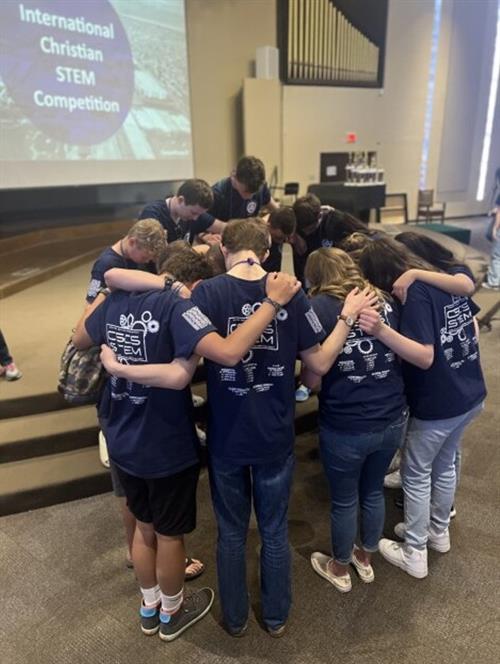
Website Terms, Conditions, Privacy Policy
Click the links below to view ACSI's Terms of Use, Privacy Policy, and Copyright DMCA Policy.
| Title | Type | Size | |
| Website Photo Video Release | doc | 44 KB | Download |
| ACSI Website Terms of Use | 268 KB | Download | |
| ACSI Website Privacy Policy ver2 11_2018 | 281 KB | Download | |
| ACSI Website Copyright DMCA Policy | 94 KB | Download |
By: Cait Harding
September 4, 2023
The lights were bright, and their throats went dry. They’d been practicing for weeks—months even—but being here at the ACSI International Christian STEM Competition was suddenly a reality.
Opening their laptops, the middle school team from Colorado Springs Christian School (CSCS) prepared to compete in the cyber security challenge against teams consisting of high schoolers.
They prepared, prayed, and reflected on what they’d been taught—that it’s okay to fail. They just wanted to put their best foot forward.
As the timer began, their inner wheels started to turn. They could do this … They knew how. And together, typing speedily on their keyboards and sharing unified thoughts, they were succeeding.
When the challenge leader called time, their burning adrenaline faded into settled contentment.
“The winning team,” she announced, “is Colorado Springs Christian School!”
The sound of applause filled the room as the middle schoolers beamed with pride.
Their STEM teacher, Christie Wingo, ran to congratulate them.
“This was an incredible experience,” she said. “I’m so proud of you. It’s important to see that there are a million ways to solve a problem, and what a great reward.”
Wingo, a former Boeing engineer, reflected on the benefits of the in-person STEM competition.
“Every single team, we had five teams, had a problem come up while they were competing,” she said. “Each team member was learning what their gift was and what they contributed to the team. They all had to learn how to really listen to each other and how to take each other’s ideas. That whole teamwork piece was incredible for them.”
Wingo encourages her students to hone their God-given skills and wants to be sure they have opportunities to explore various STEM fields.
“I have a lot of students who are super bright. Maybe they don’t excel in a standard classroom, but they just excel in STEM,” she said.
Wingo earned a degree in Aerospace Engineering from Auburn University before going on to serve as an engineer at Boeing for 7 years.
“During my time at Boeing, I supported the space shuttle program for NASA and the E4B program for the U.S. Airforce,” she shared. “It was an incredible time.”
Beginning at CSCS as a part-time math teacher, Wingo was approached by the head of school to start a STEM program.
“Our head of school came to me and said, ‘ACSI is starting to incorporate STEM,’ so I went from a part-time math teacher to a full-time STEM teacher.”
The school began with a middle school STEM elective course. After the first year, students were asking about continued opportunities, so school leadership created STEM 2, an additional follow-on course.
“It has been fast and furious,” Wingo shared. “We’ve had STEM for the last 2 years at CSCS and it’s just grown so quickly... the kids absolutely love it.”
Jonah, an eighth-grade student, shared his takeaway.
“If there is only one thing to say about STEM other than it is going to be the most fun that you will have all year is that you are going to fail at least a million times, but when you reach the solution, it will be so accomplishing that all the ideas and tests trying before will not matter anymore. Failure is the key to getting success.”
Wingo shared that this very philosophy is ingrained in the elementary STEM curriculum.
“In elementary STEM, we teach kids that it’s okay to fail—we call it ‘failing forward.’”
Several parents have expressed glowing reviews for this innovative thinking.
“The impact Christie had on the students cannot be expressed,” one parent said. “While she injected passion into a school year, her influence creates an inspiration that the students get to keep for a lifetime. It’s one thing to be excellent at mentoring students in STEM, and quite another to love the students like Christie does. It’s amazing our kids get her … her experience, her mentorship, and her love.”
Wingo shared why she is so passionate about working with students early on to develop their interests in these fields.
“There are a lot of ethical decisions that are being made in careers in technology right now,” she said. “We need people of faith involved in this technology.”
“STEM careers also tend to be very lucrative. We need people of faith in these lucrative careers because those are the ones tithing to the church, giving to missions, etc. STEM is such an important part of every school, but it especially needs to be a part of every Christian school for those reasons.”

Wingo outlined first steps for schools considering adding a STEM program.
“The first thing you have to decide on is where to focus your attention in age groups. We started in middle school,” she said.
She then suggested schools determine whether they will hire a dedicated STEM teacher or if an existing educator will incorporate the subject.
“You’ll then want to figure out how much time you’re going to have. We added a middle school STEM elective—it was a semester long and I got to see my kids every day for 45 minutes.”
Once established, educators can start focusing on content and curriculum.
“We put together our own curriculum. I picked lessons that would expose our students to as many engineering disciplines as I could,” Wingo shared.
“We have STEM in all of our grades at this point. In elementary, either they come to me for a visit at the STEM lab or the teachers consult with me on an activity.”
When asked what her advice would be for schools considering adding a program, Wingo smiled.
“Another thing that I tell my students is, even if the student isn’t interested in a career in technology, STEM is so beneficial because it teaches them the teamwork aspect, critical thinking, and problem solving, which will be a benefit regardless of which career they choose.”
To learn more about ACSI’s STEM experiences, visit the website.


